Politics
Trio win Nobel prize for revealing quantum physics in action
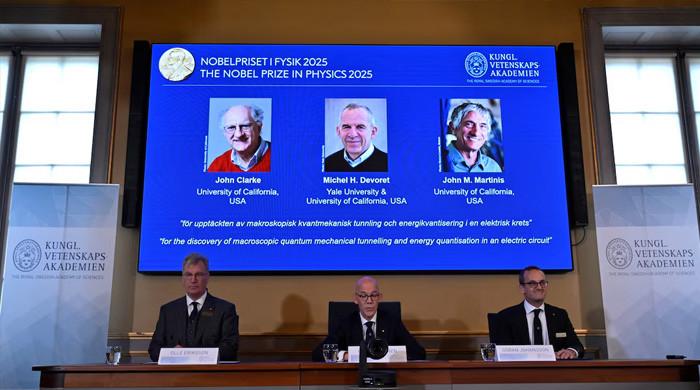
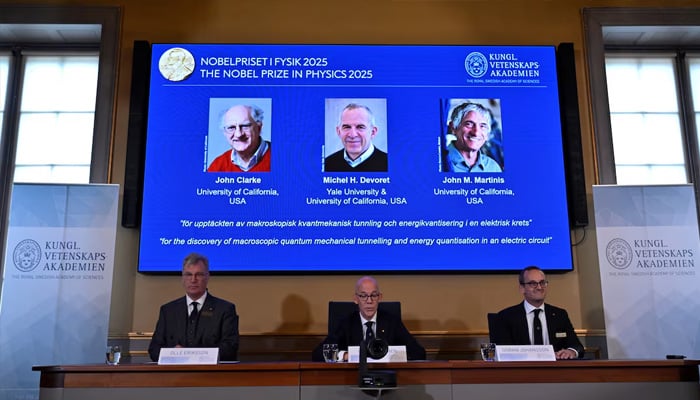
US-based scientists John Clarke, Michel Devoret and John Martinis won the 2025 Nobel Prize in Physics for “experiments that revealed quantum physics in action”, paving the way for the development of the next generation of digital technologies.
“My feelings are that I’m completely stunned. Of course it had never occurred to me in any way that this might be the basis of a Nobel Prize,” Clarke told the Nobel press conference by telephone on Tuesday.
“I’m speaking on my cell phone and I suspect that you are too, and one of the underlying reasons that the cell phone works is because of all this work.”
‘New surprises’ in century-old field of quantum mechanics
Quantum mechanical behaviours are well studied at the level of the incredibly small — atoms and sub-atomic particles — but are often seen as bizarre and unintuitive compared with classical physics and its far larger scale.
The Nobel winners carried out experiments in the mid-1980s with an electronic circuit built of superconductors and demonstrated that quantum mechanics could also influence everyday objects under certain conditions.
“It is wonderful to be able to celebrate the way that century-old quantum mechanics continually offers new surprises. It is also enormously useful, as quantum mechanics is the foundation of all digital technology,” Olle Eriksson, chair of the Nobel Committee for Physics, said.
Quantum technology is already ubiquitous, with transistors in computer microchips an everyday example.
“This year’s Nobel Prize in Physics has provided opportunities for developing the next generation of quantum technology, including quantum cryptography, quantum computers, and quantum sensors,” the Royal Swedish Academy of Sciences, which awards the prize, said in a statement.
Quantum computers use principles of quantum mechanics to make complex calculations, predict outcomes and perform analysis that in some cases could take traditional computers millions of years.
The field is considered to have the potential to help solve some of humanity’s most pressing concerns, such as tackling climate change. But it also faces challenges, including improving the accuracy of its chips, and timelines for commercially viable quantum computing remain disputed.
Politics
Saudi King Salman leaves hospital after medical tests
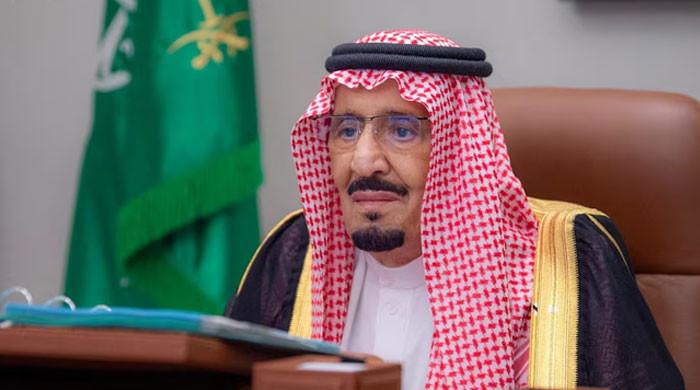
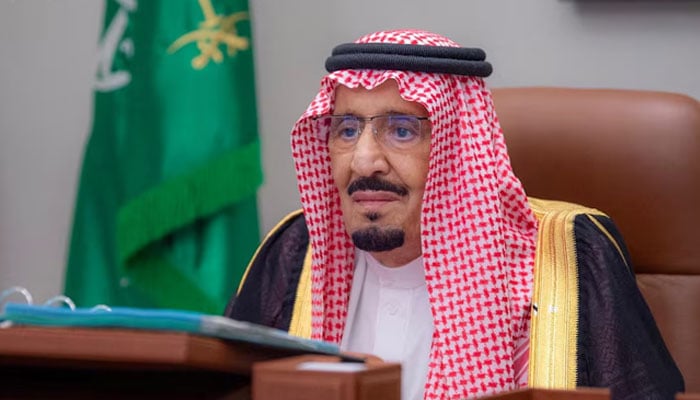
Saudi Arabia’s 90-year-old King Salman was discharged from hospital after undergoing medical tests in the capital Riyadh, the kingdom’s Royal Court said on Friday, adding that the results were “reassuring”.
The monarch “left the King Faisal Specialist Hospital in Riyadh today (Friday) after undergoing medical tests that proved reassuring”, the royal court said in a statement shared on state media, having announced his admission earlier in the day.
Saudi Arabia, the world’s biggest crude oil exporter, has for years sought to quell speculation over King Salman’s health.
He has been on the throne since 2015, though his son Mohammed bin Salman was named crown prince in 2017 and acts as de facto ruler.
The monarch’s well-being is rarely discussed, but he has been admitted for surgery and tests on multiple occasions in recent years.
In 2024, the Royal Court said he suffered from lung infections, which he recovered from.
He was hospitalised in May 2022, when he went in for a colonoscopy and stayed for just over a week for other tests and “some time to rest”, the official Saudi Press Agency reported at the time.
He was also admitted to hospital in March 2022 to undergo what state media described as “successful medical tests” and to change the battery of his pacemaker.
In 2020, he underwent surgery to remove his gall bladder.
Politics
Trump welcomes Iran move on mass executions as turmoil eases
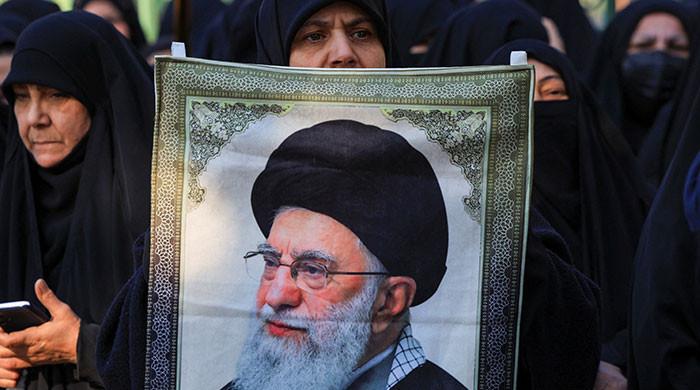
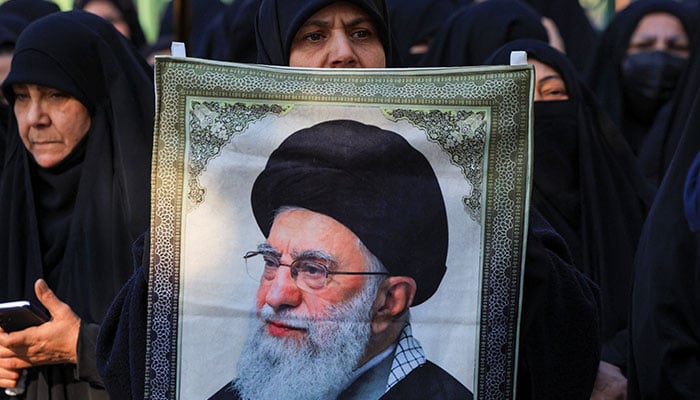
- Trump says Iran cancelled mass hangings of protesters.
- Thanks Tehran, calls move ‘greatly respected’.
- Claims more than 800 executions were scheduled.
DUBAI: US President Donald Trump has thanked Iran’s leaders for cancelling what he said were hundreds of planned executions of protesters after a crackdown.
Taking to his social media platform, he said the mass hangings had been called off and praised Tehran for the move, as deadly unrest across the country appears to be easing after a harsh crackdown.
US President Donald Trump, whose repeated threats to act had included a vow to “take very strong action” if Iran executed protesters, said Tehran’s leaders had called off mass hangings.
“I greatly respect the fact that all scheduled hangings, which were to take place yesterday (Over 800 of them), have been cancelled by the leadership of Iran. Thank you!” he posted on social media.
Iran has not publicly announced plans for such executions or said it had cancelled them.
The protests erupted on December 28 over economic hardship and swelled into widespread demonstrations calling for the end of present rule, culminating in mass violence at the end of last week. According to opposition groups and an Iranian official, more than 2,000 people were killed in the worst domestic unrest since Iran’s 1979 Islamic Revolution.
But several residents of Tehran reached by Reuters said the capital had now been comparatively quiet for four days. Drones were flying over the city, but there had been no sign of major protests on Thursday or Friday. Another resident in a northern city on the Caspian Sea said the streets there also appeared calm. The residents declined to be identified for their safety.
Prospect of US attack retreats
The prospect of a US attack has retreated since Wednesday, when Trump said he had been told killings in Iran were easing. But more US military assets were expected to arrive in the region, showing the continued tensions.
US allies, including Saudi Arabia and Qatar, conducted intense diplomacy with Washington this week to prevent a US strike, warning of repercussions for the wider region that would ultimately impact the United States, a Gulf official said.
Israel’s intelligence chief David Barnea was also in the US on Friday for talks on Iran, according to a source familiar with the matter, and an Israeli military official said the country’s forces were on “peak readiness”.
As an internet blackout eased this week, more accounts of the violence have trickled out.
One woman in Tehran told Reuters by phone that her daughter was killed a week ago after joining a demonstration near their home.
“She was 15 years old. She was not a terrorist, not a rioter. Basij forces followed her as she was trying to return home,” she said, referring to a branch of the security forces often used to quell unrest.
The US is expected to send additional offensive and defensive capabilities to the region, but the exact make-up of those forces and the timing of their arrival was still unclear, a US official said, speaking on condition of anonymity.
The US military’s Central Command declined to comment, saying it does not discuss ship movements.
Pahlavi calls for increased pressure
Reza Pahlavi, the US-based son of Iran’s last shah who has gained increasing prominence as an opposition figure, on Friday urged the international community to ramp up pressure on Tehran to help protesters overthrow the present setup.
“The Iranian people are taking decisive action on the ground. It is now time for the international community to join them fully,” said Pahlavi, whose level of support inside Iran is hard to gauge.
Trump this week appeared to downplay the idea of US backing for Pahlavi, voicing uncertainty that the exiled royal heir who has courted support among Western countries could muster significant backing inside Iran. Pahlavi met US envoy Steve Witkoff last weekend, Axios reported.
Iranian-Kurdish rights group Hengaw said that there had been no protest gatherings since Sunday, but “the security environment remains highly restrictive”.
“Our independent sources confirm a heavy military and security presence in cities and towns where protests previously took place, as well as in several locations that did not experience major demonstrations,” Norway-based Hengaw said in comments to Reuters.
Reports of sporadic unrest
There were, however, still indications of unrest in some areas. Hengaw reported that a female nurse was killed by direct gunfire from government forces during protests in Karaj, west of Tehran. Reuters was not able to independently verify the report.
The state-affiliated Tasnim news outlet reported that rioters had set fire to a local education office in Falavarjan County, in central Isfahan Province, on Thursday.
An elderly resident of a town in Iran’s north-western region, where many Kurdish Iranians live and which has been the focus for many of the biggest flare-ups, said sporadic protests had continued, though not as intensely.
Describing violence earlier in the protests, she said: “I have not seen scenes like that before.”
Video circulating online, which Reuters was able to verify as having been recorded in a forensic medical centre in Tehran, showed dozens of bodies lying on floors and stretchers, most in bags but some uncovered. Reuters could not verify the date of the video.
The state-owned Press TV cited Iran’s police chief as saying calm had been restored across the country.
A death toll reported by US-based rights group HRANA has increased little since Wednesday, now at 2,677 people, including 2,478 protesters and 163 people identified as affiliated with the government.
Reuters has not been able to independently verify the HRANA death toll. An Iranian official told the news agency earlier this week that about 2,000 people had been killed.
The casualty numbers dwarf the death toll from previous bouts of unrest that have been suppressed by the state, including in 2009 and 2022.
Politics
Trump threatens tariffs on nations opposing Greenland takeover
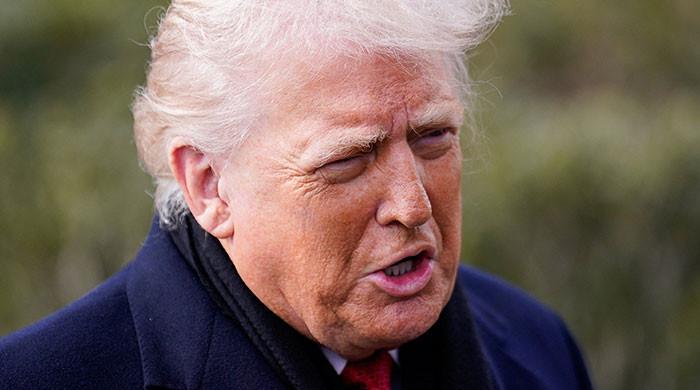
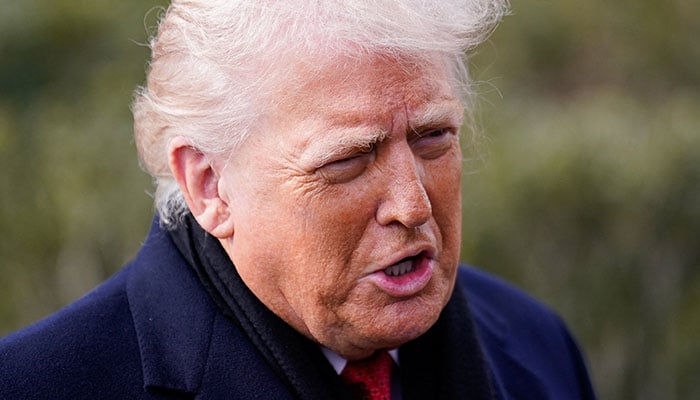
- US lawmakers visit Denmark to back Copenhagen and Greenland.
- Denmark strongly rejects Trump’s takeover idea.
- Lawmakers say most Americans do not support plan.
COPENHAGEN: US President Donald Trump on Friday warned that he could slap tariffs on countries that do not support his Greenland takeover plans, as US Congress members visited Copenhagen to give their backing for Denmark and its autonomous Arctic island.
The bipartisan delegation, on a two-day trip to the Danish capital, said the US president’s long-held territorial ambitions – strongly rejected by Denmark – were not shared by the American people.
Europeans have also been showing their backing for Greenland, in a military reconnaissance mission that a Danish general said Washington was invited to and which was linked to what Russia does after the war in Ukraine.
Trump, again insisting the United States needed mineral-rich Greenland for its “national security”, warned that he “may put a tariff” on countries that oppose that stance.
The 11 visiting US lawmakers held talks with Danish Prime Minister Mette Frederiksen and her Greenlandic counterpart Jens-Frederik Nielsen, as well as Denmark’s foreign and defence ministers, parliamentarians and business leaders.
Republican Senator Lisa Murkowski said there was “good dialogue” and stressed it was important to “nurture” ties between the United States, Denmark and Greenland.
“The vast majority” of Americans do not agree that it is a good idea for the United States to acquire Greenland, she told reporters.
“Greenland needs to be viewed as our ally, not as an asset,” she added.
One idiot
The visit follows a meeting in Washington on Wednesday at which Danish representatives said Copenhagen and Washington were in “fundamental disagreement” over Greenland’s future.
Democratic Senator Chris Coons said the purpose of the Congress members’ visit was to “listen respectfully to our friends, our trusted allies and partners here in Denmark and from Greenland”.
The lawmakers were then to return to the United States “and share those perspectives so that we can lower the temperature and have a more constructive dialogue about the best path forward”, he said.
In Greenland’s capital, Nuuk, residents welcomed the show of support.
“Congress would never approve of a military action in Greenland. It’s just one idiot speaking,” a 39-year-old union representative told AFP.
“If he (Trump) does it, he’ll get impeached or kicked out. If people in Congress want to save their own democracy, they have to step up,” said the union rep, speaking on condition of anonymity.
Demonstrations
Trump has repeatedly criticised Denmark – a NATO ally – for, in his view, not doing enough to ensure Greenland’s security.
The US president has pursued that argument, despite strategically located Greenland – as part of Denmark – being covered by NATO’s security umbrella.
The head of Denmark’s Joint Arctic Command, Major General Soren Andersen, said the United States were invited to the military mission, which he said was “about Russia”.
“When the war in Ukraine is over, hopefully with a good result for Ukraine, it is our expectation that Russia will move the resources they have been using in Ukraine to other theatres, including in the Arctic,” he told AFP.
“So, in order to prepare for that, we simply have to step up, train, and that is what we are doing up here.”
But Andersen said he had not seen any Russian or Chinese combat ships in the area in the two and a half years he has been commander.
Military personnel were more visible in Nuuk on Friday, an AFP journalist said, days after Denmark said it was beefing up its defence on the island.
The White House has said Trump’s aim to take over Greenland would not be affected by the European military presence, which French armed forces minister Alice Rufo said was a sign that the continent was prepared to defend sovereignty.
Britain, Finland, France, Germany, the Netherlands, Norway and Sweden have announced the deployment of small numbers of military personnel to prepare for future exercises in the Arctic.
Large demonstrations are planned across Denmark and Greenland on Saturday to protest against Trump’s plan.
Thousands of people have taken to social networks to say they intend to take part in the protests organised by Greenlandic associations in Nuuk and Copenhagen, Aarhus, Aalborg and Odense.
-

 Tech4 days ago
Tech4 days agoNew Proposed Legislation Would Let Self-Driving Cars Operate in New York State
-

 Sports6 days ago
Sports6 days agoClock is ticking for Frank at Spurs, with dwindling evidence he deserves extra time
-
Sports1 week ago
Commanders go young, promote David Blough to be offensive coordinator
-

 Fashion6 days ago
Fashion6 days agoSouth India cotton yarn gains but market unease over US tariff fears
-

 Entertainment4 days ago
Entertainment4 days agoX (formerly Twitter) recovers after brief global outage affects thousands
-

 Fashion6 days ago
Fashion6 days agoChina’s central bank conducts $157-bn outright reverse repo operation
-

 Business1 week ago
Business1 week agoSoftBank reduces Ola Electric stake to 13.5% from 15.6% – The Times of India
-

 Sports6 days ago
Sports6 days agoUS figure skating power couple makes history with record breaking seventh national championship






